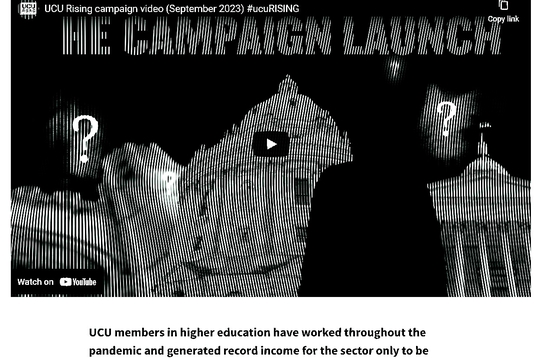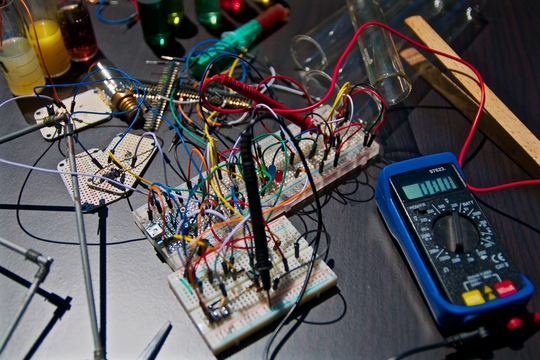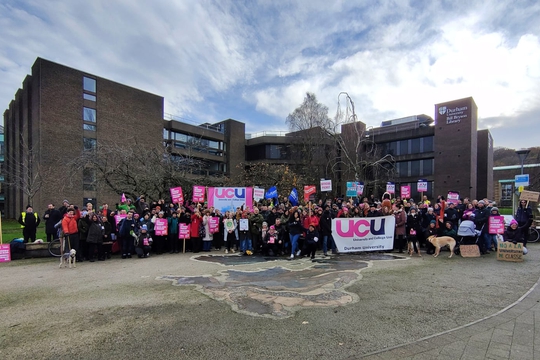Don't Bank On It
by
The University Worker
September 28, 2023
A reflection on the 2023 UCU dispute, the “bank and build” strategy, and where next

bulletins
Don't Bank On It
by
The University Worker
/
Sept. 28, 2023
A reflection on the 2023 UCU dispute, the “bank and build” strategy, and where next
For those of us who have been involved with UCU for many years, the current moment may not come as much surprise. However, the specific features of the current fuck up are a bit different. In the last phase of the dispute, we were “Looking Back in Anger”, and in this editorial, we want to think about what has changed this time around.
Back then, we argued;
Over 42,000 staff members struck, affecting around 575,000 teaching hours and over a million students. The action remained solid over the 14 days spread over 4 weeks … UCU recruited 16,000 new members in the process, demonstrating once more - for the people at the back - that the most effective way for unions to mobilise is to take action for better pay and conditions for their members.
A deal to effectively pause the changes to the pension scheme, but leave it in the hands of a Joint Expert Panel split between the employers and the union, with an “independent” chair (who, spoilers, ended up being on the employers’ side). This was accepted by the membership, although 36% of those who voted still rejected it. At the time, we also argued that
In this context, the question of democracy, of who runs the union and how, and of accountability of leaders will continue to shape much of the political life of the UCU. In addition, in this process the balance sheet of the current leadership will increasingly be scrutinised by members, who will be confronted with the poor results of the present strategy. We should therefore expect greater calls for more sustained action, more militant tactics, and far greater democratic oversight by the membership
This time, we’ve ended up in a situation that is both similar and different. However, the concerns of 2018 remain important today.
We have organised a marking and assessment boycott (MAB) and will have the mandate for industrial action run out at the end of September. There have been some terrible excuses for this: either that there aren’t enough staff at the only company able to run postal ballots (despite there being more than one company) or that members wouldn’t vote over the summer - despite many being engaged in a MAB.
From 2018 to 2023
So, what has changed since 2018?
First, the idea of a rank-and-file has been popularised, particularly through the strike wave of 2023. However, there is often a gap between what we mean by rank-and-file and its practice. For The University Worker, this means focusing on building workers’ power amongst the membership of the UCU, not relying on staff, elected officials, or the national leadership. It means developing the skills, organisational capacities, and confidence to fight for our own strategies in higher education. Unlike other factions in UCU, this means not engaging in electioneering and manoeuvring at the top of the union, but instead starting from below.
It is, however, worth noting that there have been changes at the top of the union in the last five years. The current general secretary, elected on a so-called rank-and-file ticket, has now been in post for the majority of their tenure. Under their leadership, the decisions and staff have moved further to the right, becoming less responsive to the democratic processes of the union and more isolated. The HEC (Higher Education Committee), that takes many decisions on behalf of members, is riven by factionalism. First, there is UCU Commons, which started around the last general secretary elections and has steadily lurched to the right. In the process, it has become a right-wing bloc with the existing right of UCU, the Independent Broad Left (IBL, despite being none of these in practice) a collection of Blairites, Stalinists, and assorted right-wingers. A new so-called “factionette”, the Campaign for Union Democracy, has recently emerged from this, obsessed with eballoting members (more on this below) rather than any serious democratic change. On the other side, is UCU Left, the historic left-wing opposition in the union, dominated by the Socialist Workers Party (SWP). There is also a collection of independent HEC members not tied to any other faction. The right is currently the majority on the HEC.
One major difference from 2018 is that the leadership of the national union has changed. This has led to a shift in communication style, but in practice, that change is more complicated. There are also two other factors to consider. First, the COVID-19 pandemic has changed how unions are organised, with many branches and meetings shifting online, as well as less presence on campus. This has meant that many decisions are taken via polling without much face-to-face debate. Similarly, sections of the bureaucracy have been pushing eballots as a “more democratic” method. The effect of this is that an increasing number of decisions are taken in an abstract way, with the terms of the debate set in advance: do you want this option or that? There is much less space for debate on tactics and strategies, let alone collective forms of decision-making. It precludes alternative perspectives from being heard, centralising power with those asking the questions. At the same time, HEC members stick to a confidentiality rule (presumably designed to stop employers from finding things out) and refuse to share the results of discussions or votes with the membership.
Second, there was a serious debate (although lost) on taking indefinite action at the start of 2023. This was part of a much more ambitious plan of industrial action that could have included a MAB starting in January. It is worth remembering that this version of the action was quite different from what UCU ended up doing later in the year. Arguments were made by the bureaucracy about the need to plan and get things in place before taking action. Yet, what we ended up with was a much watered-down version of the MAB. There was so little preparation from UCU that it would not be a stretch to say that the bureaucracy was systematically undermining the action. Instead of calling everyone out on the boycott, the UCU advised that only some markers refused their work, particularly those marking third-year and masters papers. This meant the action fell on a small number of members, while also reducing the overall headache for management in finding scabs to do the marking.
When it came to the crunch of the MAB, many members were surprised at how willing university managers were to suspend regulations and push forward alternatives that undermined academic integrity. It is an important reminder that a degree is socially constituted: if managers say and employers accept that a degree is a degree, then it becomes one in practice.
The current moment
This has been an extended period of action in which most employers have been prepared to engage in punitive deductions of wages and stonewall negotiations. The UCU strike is part of a wider public sector strike wave in which most disputes have ended with below-inflation pay cuts. This is difficult terrain for university workers to win on.
The leadership of UCU have deliberately ignored a motion from Congress (the delegate conference meeting that UCU holds) and refused to hold a re-ballot. This is why we have ended up with a gap in our mandate. The ballot has now started (as of 20th September and running until the 3rd of November). This pushes any future industrial action until at least two weeks (the legally required notice) after the results are announced.
Part of this comes from the UCU leadership believing that the current dispute cannot be won. At every stage, the leadership put forward alternative strategies that were mostly versions of: “Let’s do less action a bit better in the future.” When they look down at the membership, they see a disorganised union that won’t listen to their ideas. It makes sense to work up a plan in HQ, influenced by the fashionable organising ideas of the moment, thick with technical terms and stages to follow. They don’t see what members build in different universities or the anger from more and more workers in higher education. They want to pull the action because they want control of what comes next. Another part comes from factions who don’t see collective action as a route to change.
In the meantime, UCU leadership announced strike days for the last week of the mandate (25-29 of September). Under pressure from the right of the union not wanting to strike, an emergency HEC was called that offers branches the option to “opt-out”, so long as they have either an eballot, a branch meeting, or a committee meeting to approve this. There are two problems with this: first, there was no consultation on the strike dates, meaning many branches do not see the point in taking more action. Second, at this final stage of the current industrial action ballot, UCU is now encouraging branches to break the action. This sets a dangerous precedent that if members don’t want to participate in national action, they can ask to withdraw.
Some parts of UCU are calling the recent change in negotiations on the USS a victory. A restoration of previously cut benefits would indeed be a victory, but there is still a way to go between consultation and a signed deal. There are still branches fighting punitive deductions, as well as some that have been able to win concessions locally. It would have been stronger to hold the action together - as well as not throw members under the bus who aren’t in USS.
More worryingly, it now means that we’re entering a period of no industrial action mandate, trying to build a Get The Vote Out (GTVO) campaign, all while the strikes fall apart around us. However demoralised we may feel right now, the GTVO campaign is an opportunity to reach out beyond the core of members in the MAB and refresh the union.
It is also important to remember that a lot has changed since 2018. We have built new organisational capacities through the MAB, holding members together to take the most serious industrial action that UCU has been through. There have been major successes in US Higher Education that we can learn from in UCU. We have published accounts of these, along with a longer-term strategy for breaking the current impasse here.
An important feature remains: we have failed to democratise the union, renew or replace the structures, and keep up the pressure from below to get the kind of action we need to win. However, there isn’t anyone coming to save us. A different composition of the HEC didn’t shift things in the past, and neither did electing another general secretary. Instead, we need to focus on building our collective rank-and-file power.
This means addressing the changes to work in higher education, taking seriously demands around our own. The most pressing issue is casualisation, particularly as the membership of the union increasingly skews between lower-paid, precarious members and higher-paid professors mostly concerned with pensions.
We don’t want to “bank and build”
The major difficulty that we face is the continuing problem of our organising inheriting from the defeats of the past, having to fight in the current conditions, while trying to find a way forward. Some in UCU have argued to call off the action, reflect, and rebuild for a fight in the future. We do not have the luxury of retreating in the face of intransigent and aggressive employers. This can feel appealing during a period of exhaustion. We urgently need to strengthen our union, but pausing the action is no way to do it.
“Bank and build” is a catchy slogan, but it is better suited to a game show than organising at work. Victories that we have in our dispute are a result of the pressure we are able to put management under, both locally and nationally. None of the victories we’ve achieved are “bankable”, they need to continue to be fought for. It gives the impression that we are the ones who have precipitated the dispute: we’re asking for the Four Fights demands, but apart from that, the university sector will continue as normal. However, there are huge changes coming down the pipeline. First, home student numbers have fallen, and international student recruitment is shifting. These changes are nothing compared to what the Conservative government is proposing for the future: changing the student loan system so it can be spent on non-university education, while aiming to reduce the number of young people choosing university to a third. This is a future in which educational opportunities will be further divided along class lines, and the inequalities between universities exacerbated. This means more isolated fights against restructures, redundancies and, inevitably, closures. In this context, the current loss is not only about failing to win on the Four Fights, but setting a much worse terrain upon which we will have to fight these changes.
At this moment, a pause in fighting, no matter how well-intentioned, will be exploited by the employers. There is no respite in a sector plagued by a workload crisis. Slowing down now will only make mobilising members more difficult in the future. Particularly when the demoralisation of the last dispute sets in. Not only do we walk away without concessions, but our managers walk away with impunity after openly attacking union branches.
Instead, we need to find a way to reflect and strategise while continuing to fight. This means we need to do five things:
- Debate and discuss strategy in and between our branches. We continue to call for contributions to The University Worker that can be shared as a starting point
- Build on and develop the organisational capacities of the MAB. We need to mobilise through our networks and structures, not just fold back into semi-regular branch meetings
- Get involved in the GTVO campaigns and fight for a rank-and-file strategy. This is an opportunity to get out and talk to members, win people to the union, and another way of organising
- Call cross-union meetings on campus to start coordinating with other groups of workers who cannot be members of UCU. Building our industrial power will be vital for the fights ahead
- Throughout all of the above, we need to keep raising the political horizons of our disputes. Yes, we are balloting over relatively narrow issues, but making demands for a free, accessible, and transformative education can politicise our dispute in new ways
author
The University Worker
Subscribe to Notes from Below
Subscribe now to Notes from Below, and get our print issues sent to your front door three times a year. For every subscriber, we’re also able to print a load of free copies to hand out in workplaces, neighbourhoods, prisons and picket lines. Can you subscribe now and support us in spreading Marxist ideas in the workplace?
Read next

The T Levels Mess
by
Tom White
/
Sept. 26, 2023

